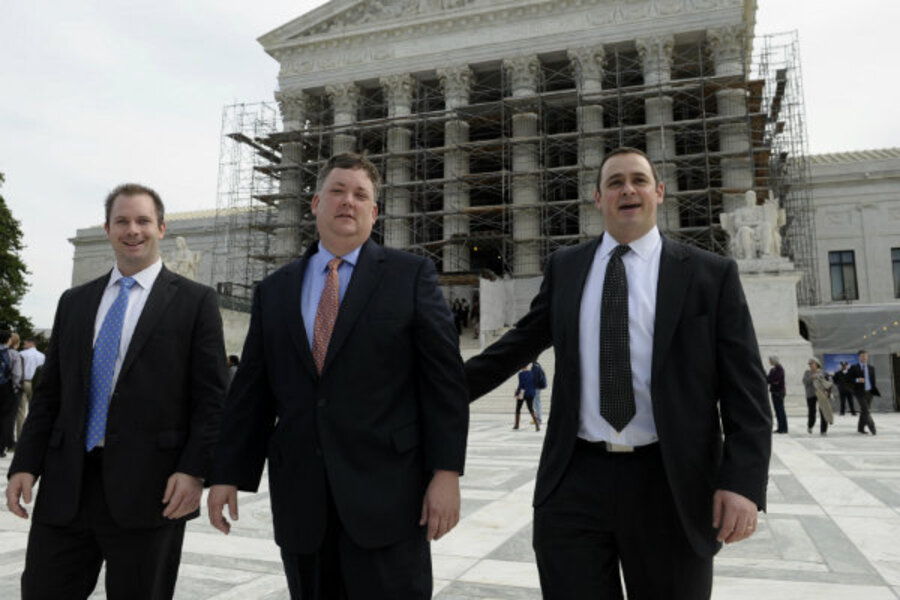How candidates can sidestep Supreme Court rulings on campaign finance
Loading...
| Nashville, Tenn.
Earlier this month, the Supreme Court heard arguments in McCutcheon v. Federal Election Commission, the most recent challenge to campaign finance restrictions. With the real possibility of the court striking down yet another campaign finance law, reformers are starting to worry about what happens next.
Since the Supreme Court’s ruling in Citizens United opened the floodgates for corporate money in elections three years ago, legislative efforts to limit the corrupting influence of money in politics have been unsuccessful. But that does not mean there is no hope.
Recently, another approach has emerged: private contracts between candidates about spending by third party groups outside the control of the campaign. Private contracts are not a silver bullet, but in the context of a gridlocked Congress and a Supreme Court that has been hostile to campaign finance restrictions, they can help limit the worst excesses of campaign spending.
The private contract approach gained visibility last year with the Elizabeth Warren–Scott Brown Senate race in Massachusetts. In late January 2012, the two candidates signed what they called “The People’s Pledge,” which succeeded in keeping third-party groups – including those from outside the state – out of TV, radio, and Internet advertising in the most-expensive Senate race in American history.
The pledge required each campaign to pay to charity the equivalent of 50 percent of any outside group's advertising costs, for ads that benefited their candidacy. Up until that point, outside, third-party groups like the League of Conservation Voters and Karl Rove’s Crossroads USA spent millions of dollars on advertisements on the candidates. After two minor third-party incursions in March (with penalties paid by the Brown campaign)*, the People’s Pledge held until Election Day, with no other outside groups entering the race for fear of harming their preferred candidate.
Since the Warren-Brown race last year, there has been a small but emerging trend of other campaigns debating – and in some cases adopting – variations on the People’s Pledge. The trend has especially taken hold in Massachusetts, where the pact originated.
For example, the People’s Pledge was adopted with slight variations in the 2013 Senate primary to fill now-Secretary of State John Kerry’s Senate seat in Massachusetts and in the 2013 special election primary to fill now-Sen. Ed Markey’s seat in the House.
The People’s Pledge has also been debated publicly for this year’s Boston mayoral race and for next year’s Massachusetts gubernatorial race. It was also discussed in the recent special election primary race in New Jersey to fill Frank Lautenberg’s Senate seat. (Newark Mayor Cory Booker won the Democratic primary and the election).
Private contracts like the People’s Pledge evade the Supreme Court’s Citizens United decision, which ended restrictions on independent corporate spending during elections. These agreements get around the ruling precisely because they are private.
The Supreme Court’s theory of free speech in Citizens United is based on limiting government restrictions on private speech. As Justice Kennedy wrote, “political speech must prevail against laws that would suppress it, whether by design or inadvertence.” The private-contract approach involves no government restrictions – no laws or regulations – and it does not even require legal enforcement of the contract through the courts.
Private contracts also put opponents of campaign finance restrictions in a bind. If opponents of campaign finance laws genuinely support keeping government out of speech, they should support self-enforcing contracts as a way to keep decisions about free speech within the private realm. The reality, of course, is that the opponents of government restrictions on campaign spending would then have to live with private restrictions on campaign spending.
To the extent that opponents of campaign finance laws prefer maximizing speech – and spending – in elections, they have a bigger problem. Supporting government intervention to regulate or ban private contracts like the People’s Pledge contradicts their position that government should not intervene.
To be sure, private contracts won’t work in every election. Candidates will weigh a variety of factors in determining whether they can come to an agreement: their personal values, how much money they and their opponents will raise, demand from the public and media to keep money out of politics, their chances of winning.
Sometimes neither candidate will want to make a deal. Sometimes one candidate will offer and the other will reject the deal. But in some cases – like the Warren-Brown Senate race in Massachusetts – private contracts can work to restrict the outsized influence of third-party spending.
Private contracts can’t fully halt the corrupting tide of corporate money in politics that Citizens United unleashed. And candidates might need to adopt new types of private contracts if the Supreme Court further loosens restrictions on money in politics in the McCutcheon case. But in the absence of more robust campaign finance reform laws, private contracts can help keep big money from drowning our democracy.
Ganesh Sitaraman is an assistant professor of law at Vanderbilt Law School and a senior fellow at the Center for American Progress. From 2011 to 2013 he served as policy director and senior counsel to candidate and Sen. Elizabeth Warren (D) of Massachusetts, including during the writing of the People’s Pledge.
*[Editor's note: The original version of the piece mis-stated who paid penalties for breaking a private-contract on campaign financing.]







